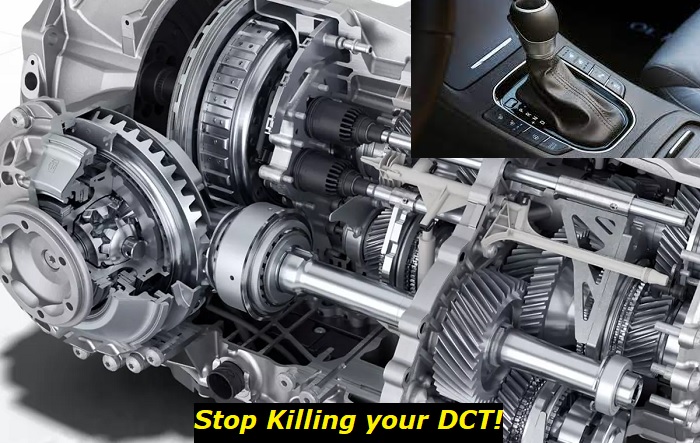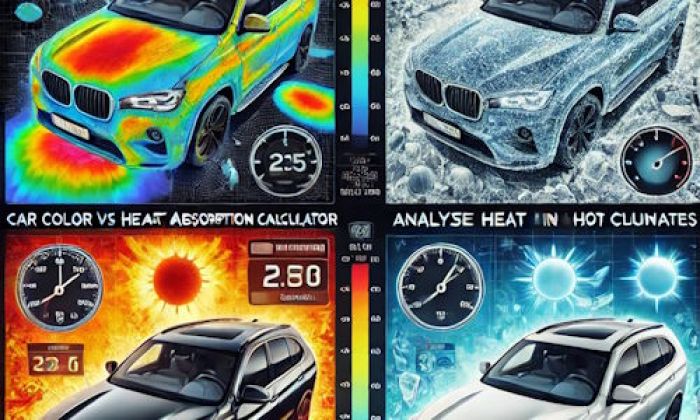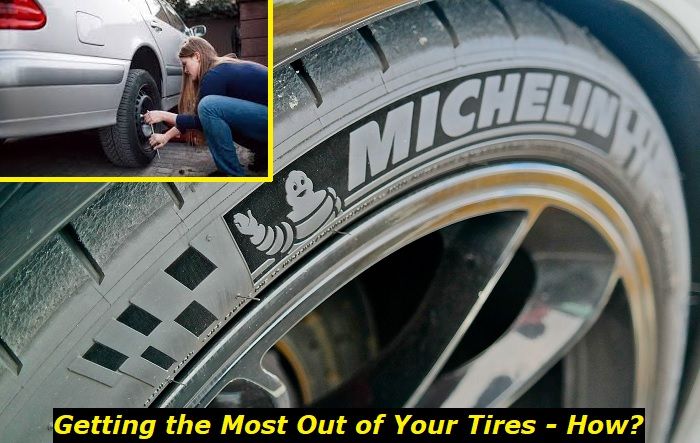DCT or Dual-Clutch Transmission is the unit that is now super popular among car manufacturers. This is the modern alternative to the conventional automatic transmission and, unfortunately, it can't boast the same durability. This is not a secret - these transmissions don't live long.
The usual problems of the DCT unit are the clutch pack, transmission control unit (TCU), mechatronic failure, and software problems.

But are you actually killing this transmission when driving with your usual habits? And what should you do to prolong the life of your dual-clutch transmission? In this article, I will tell you everything I know.
What are the risky units of this transmission?
The weak links of a DCT unit are:
- clutch pack, especially if this is the transmission with the so-called dry clutch;
- TCU or TCM (for unit or module) - the transmission computer can malfunction and basically kill the gearbox;
- the mechatronic - this is the mechanism that physically shifts the gears for you when the TCU tells it to do so.
That's all. Usually, all other parts and units of the DCT are more or less durable. You should also know that this is actually the manual transmission (which is pretty reliable) with the attached mechatronic and control modules to shift the gears automatically.
So, the technology that lies behind the DCT is pretty simple and reliable. But all these "automatic" modules and also the very complicated and technologically advanced clutch pack make things much worse.
Your actions that kill the DCT unit
Unfortunately, a lot of DCT gearboxes fail just because they are faulty. And sometimes, you just can't do anything with it. You may drive carefully and pray for the health of your transmission every Sunday, but this won't change the fact that the manufacturer screwed up when engineering the unit.
But still, here are some habits that can kill this transmission much faster than you think:
1) Aggressive driving
There are two clutches in the clutch pack of these transmissions. They are almost always in semi-engaged mode. And the computer expects certain behavior from you even sometimes predicting your actions.
If your driving is unpredictable and you can sometimes hit the gas pedal as if you've just gone mad, the DCT will suffer a lot.
Also, aggressive driving may easily make your clutch wear much faster than average.
2) Constant changes in driving style
Almost all DCT gearboxes are "intuitive" and "smart". They will adjust to the driving style. For example. when you are driving on the highway, they implement a certain style of shifting to ensure the best experience for highway driving.
When you are in the city traffic again, your transmission may jerk a little while it retrains for the new driving style and it's completely OK.
But if you change the driving style every time you are driving or several different people drive the car, this may actually lead to much sooner death of the clutch pack.
3) Traffic jams and slow city traffic
You shouldn't use the DCT in the same way as you would use a conventional automatic transmission in slow traffic. If you have a simple old gearbox, you will leave it in D whatever happens for the whole hour while you are in the slow traffic. For the DCT it means the death of the clutch and mechatronic.
The majority of DCT transmissions will hate shifting between 1st and 2nd gears. And this is what's happening when you go in slow traffic. So, I strongly recommend using Sport mode to only drive in the first gear (or maybe manual mode if you have one).
Also, use Neutral once your car is stopped for more than a minute. This will help you disengage the clutch and avoid it being worn out in the semi-engaged mode.
4) Not changing oil
While for the majority of DCT transmissions with dry clutch oil changes are not really important, wet-clutch transmissions require regular service. I had experience with 6-DSG and I had this problem of not changing fluid on time by the previous owner. The new clutch pack cost me a fortune.
I recommend changing transmission fluid at least 20,000 miles before the manufacturer tells you to do this.
5) Towing
Please don't tow anything at all if you are using the DCT. As I already said before, these transmissions are "smart" and will adapt to a certain driving style. When you start towing something, the gearbox will go mad because of a serious change in the car's behavior.
Serious damage to the clutch and mechatronic may happen when shifting. Because one of the transmissions disengages one clutch, the other clutch gets all the load in the world and will obviously be wearing out intensively.
If you want to tow something with your car, opt for a vehicle with a conventional automatic transmission.
What can you do to prolong the life of the DCT?
The question of prolonging the life of this transmission is really complicated. There is a certain limitation of miles that these transmissions can last.
For example, the PowerShift (Ford) will go about 100,000 miles or a little less than that. After this milestone, it will require the new clutch pack and maybe the new TCU. Here, I've written about the PowerShift's most annoying issues.
The 7-DSG transmission (Volkswagen) can last about 120,000 miles if you are very lucky. Some had to repair it at 40K miles or so.
The EcoShift transmission (Hyundai) is still not really investigated but I already know about the cases of early failure. By the way, read more about KIA and Hyundai DCT units here.
There are dozens of them and each transmission will have its own list of possible issues and recommendations for prolonging its life. But I've compiled a more or less common list:
- Avoid driving in slow traffic in D - use Sport mode or Manual mode and try to avoid shifting a lot between the first and second gears.
- Don't let your car stand still on D - shift to N when you are going to be stationary for more than a minute.
- Change fluid more often - use a short fluid change interval to avoid clutch wear in wet-clutch transmissions.
- Don't drive aggressively. Also, avoid changing your driving style many times a day.
- Don't tow. Just forget that your manual may say that the car may tow some hundred pounds. No, it can't, don't tow even a toy trailer.
- Remember common sense. Shift calmly, shift only after fully stopped, and don't drive if there is something wrong.
These tips may seem really simple to you but they may save your dual-clutch transmission from being an absolute disaster for your budget. I can keep on listing common-sense tips but I hope you are aware of them. Make sure your transmission lives a happy life and doesn't get damaged just because you drive your car carelessly.
What's that huge problem with clutches?
When reading this article, you may have noticed that clutch issues are the king when it comes to DCT problems. And you are right. But you may think - hey, it's just a clutch. You replace it and drive further!
And you are partially right. But do you know how much the clutch costs for a DCT? And how much will the mechanic ask for labor? You will be surprised.
On average, the cheap mass-market dual-clutch transmission will use the clutch pack that costs about $1,500. And one more blow - there are no aftermarket packs. Only OEM and very expensive.
Also, a good mechanic will ask at least $700-$800 for labor. The dealers will charge well over a thousand because to change the clutch pack you basically need to tear down the entire transmission.
So, yes, sometimes it's just not worth repairing such a car after clutch failure. I've seen 10-12-year-old Focuses with PowerShift gearboxes going to junkyards because their clutches failed. Ridiculously, the residual value of such cars is lower than the cost of repair.
Are all dual-clutch transmissions that bad?
No, of course not. Ferrari has a wonderful DCT. Also, Porsche uses perfect DCT in its top-range vehicles. Sports cars have been using DCT transmissions for a long time. But those are a little different from the mass-market transmissions.
If you take the BMW and Mercedes, they also use DCTs but I haven't seen so many complaints about them. I should fairly tell you that I haven't yet serviced or repaired such a transmission, so there is nothing I can say about its engineering or durability.
But all those annoying PowerShift, EacyTronic, DSG, and other mass-market DCTs are really lemons, in my opinion, and you will most likely regret buying a car equipped with them.
Do you have any experience with DCT that you want to share? Do this in the comments section below!
About the authors
The CarAraC research team is composed of seasoned auto mechanics and automotive industry professionals, including individuals with advanced degrees and certifications in their field. Our team members boast prestigious credentials, reflecting their extensive knowledge and skills. These qualifications include: IMI: Institute of the Motor Industry, ASE-Certified Master Automobile Technicians; Coventry University, Graduate of MA in Automotive Journalism; Politecnico di Torino, Italy, MS Automotive Engineering; Ss. Cyril and Methodius University in Skopje, Mechanical University in Skopje; TOC Automotive College; DHA Suffa University, Department of Mechanical Engineering






Add comment